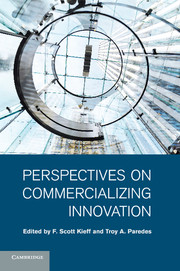Book contents
- Frontmatter
- Contents
- Contributors
- Dedication
- Acknowledgments
- Introduction
- Part I Perspectives on Theories of Intellectual Property
- 1 Intellectual Property and the Theory of the Firm
- 2 A Transactional View of Property Rights
- 3 The Modularity of Patent Law
- 4 Forging a New Environmental and Resource Economics Paradigm
- 5 Privatizing the Public Domain
- Part II Perspectives on the Problems of Anticommons and Patent Thickets
- Part III Perspectives on Finance and Commercialization
- Part IV Perspectives on the University Innovation
- Part V Perspectives on International Considerations
- Index
- References
2 - A Transactional View of Property Rights
from Part I - Perspectives on Theories of Intellectual Property
Published online by Cambridge University Press: 05 December 2011
- Frontmatter
- Contents
- Contributors
- Dedication
- Acknowledgments
- Introduction
- Part I Perspectives on Theories of Intellectual Property
- 1 Intellectual Property and the Theory of the Firm
- 2 A Transactional View of Property Rights
- 3 The Modularity of Patent Law
- 4 Forging a New Environmental and Resource Economics Paradigm
- 5 Privatizing the Public Domain
- Part II Perspectives on the Problems of Anticommons and Patent Thickets
- Part III Perspectives on Finance and Commercialization
- Part IV Perspectives on the University Innovation
- Part V Perspectives on International Considerations
- Index
- References
Summary
Property rights and contract law are two of our most basic legal categories. Many legal scholars describe what makes them different; this chapter describes how they work together to promote economic exchange. Incorporating the insights of both “transaction cost” and “new property rights” economics, it identifies two crucial contributions that property rights make to real-world contracting: (1) precontractual liability, or protection for disclosure of sensitive information in the period leading up to contract formation; and (2) enforcement flexibility after a contract is executed, in the form of many subtle but important advantages that accrue to a contracting party who also holds a property right. This chapter argues that property's “transactional” role is growing in importance, as the “new economy” ushers in a more transaction-intensive industrial structure featuring greater numbers of smaller, more specialized firms.
I think you can often learn more about how the economic system works by reading law books and cases in law books than you can by reading economics books, because you do get descriptions of actual business practices that are difficult to explain.
– Ronald CoaseINTRODUCTION
Property rights and contracts are two of our most fundamental legal concepts. They are usually thought of as freestanding, if not contrasting, legal categories. Theorists often invoke the limitations of contracts to illuminate the essential features of property rights. From this approach a rich and influential literature has emerged. The “legal entitlements” literature, for example, highlights the significance of differing default remedies – money damages in contracts, injunctions in property. Other writings emphasize the rationale for the limited categories of property entitlements, in comparison with the ability of contracting parties, to create almost limitless obligations. With some exceptions, commentators continue to analyze and discuss property and contract as opposing concepts and quite distinct legal categories.
- Type
- Chapter
- Information
- Perspectives on Commercializing Innovation , pp. 47 - 82Publisher: Cambridge University PressPrint publication year: 2011



